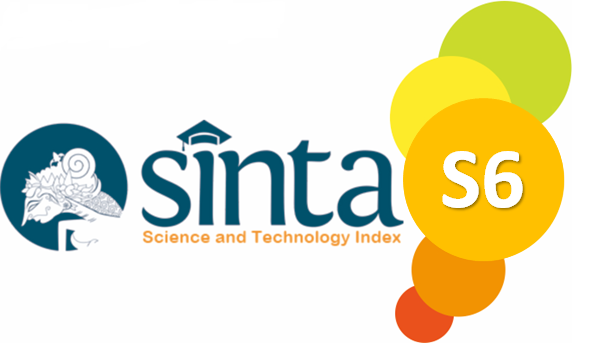Studi Literatur: Penilaian Kompetensi Keberlanjutan dan Hasil Belajar Education for Sustainable Development (ESD)
DOI:
https://doi.org/10.52434/jpu.v17i1.2553Abstract
Penulisan artikel ini bertujuan untuk memaparkan hasil studi literatur sistematis terkait penilaian kompetensi keberlanjutan dan hasil belajar education for sustainable development (ESD). Langkah-langkah yang dilakukan dalam studi literatur sistematis ini meliputi pemilihan topik, pemilihan dan seleksi literatur yang relevan dengan topik, analisis dan sintesis tulisan, serta pengorganisasian tulisan. Hasil studi literatur menunjukkan bahwa terdapat delapan kompetensi keberlanjutan dan tiga domain hasil belajar ESD yang harus dicapai dalam penerapan atau implementasi ESD. ESD sangat relevan untuk diimplementasikan dalam pembelajaran IPA. Dalam implementasi ESD pada pembelajaran dilakukan penilaian terkait kompetensi keberlanjutan dan hasil belajar ESD. Penilaian harus dilakukan secara menyeluruh dan melibatkan seluruh domain hasil belajar tanpa terkecuali. Terdapat beberapa jenis penilaian yang cocok untuk digunakan dalam penilaian kompetensi keberlanjutan dan hasil belajar ESD, seperti studi kasus, portofolio, penilaian berbasis proyek, jurnal reflektif, dan skala Likert.
References
Agusti, K. A., Wijaya, A. F. C., & Tarigan, D. E. (2019). Problem Based Learning Dengan Konteks Esd Untuk Meningkatkan Keterampilan Berpikir Kritis Dan Sustainability Awareness Siswa Sma Pada Materi Pemanasan Global. VIII, SNF2019-PE-175–182. https://doi.org/10.21009/03.snf2019.01.pe.22
Biasutti, M., & Frate, S. (2017). A validity and reliability study of the Attitudes toward Sustainable Development scale. Environmental Education Research, 23(2), 214–230. https://doi.org/10.1080/13504622.2016.1146660
Bramwell-Lalor, S. (2019). Assessment for Learning on Sustainable Development. In Encyclopedia of Sustainability in Higher Education (pp. 1–9). Springer International Publishing. https://doi.org/10.1007/978-3-319-63951-2_1-1
Concina, E. (2019). Learning Outcomes for Sustainable Development. In Encyclopedia of Sustainability in Higher Education (pp. 1–7). Springer International Publishing. https://doi.org/10.1007/978-3-319-63951-2_220-1
Cörvers, R., Wiek, A., de Kraker, J., Lang, D. J., & Martens, P. (2016). Problem-Based and Project-Based Learning for Sustainable Development. In Sustainability Science (pp. 349–358). Springer Netherlands. https://doi.org/10.1007/978-94-017-7242-6_29
Eilks, I. (2015). Science education and education for sustainable development - justifications, models, practices and perspectives. Eurasia Journal of Mathematics, Science and Technology Education, 11(1), 149–158. https://doi.org/10.12973/eurasia.2015.1313a
Eliyawati, Widodo, A., Kaniawati, I., & Fujii, H. (2023). The Development and Validation of an Instrument for Assessing Science Teacher Competency to Teach ESD. Sustainability (Switzerland), 15(4). https://doi.org/10.3390/su15043276
Hariyono, E., Abadi, A., Liliasari, L., Wijaya, A. F. C., & Fujii, H. (2018). Designing Geoscience Learning for Sustainable Development: A Professional Competency Assessment for Postgraduate Students in Science Education Program. Jurnal Penelitian Fisika Dan Aplikasinya (JPFA), 8(2), 61. https://doi.org/10.26740/jpfa.v8n2.p61-70
Kalsoom, Q. (2019). Assessment of Sustainability Competencies. In Encyclopedia of Sustainability in Higher Education (pp. 1–5). Springer International Publishing. https://doi.org/10.1007/978-3-319-63951-2_331-1
Lestari, H., Ali, M., Sopandi, W., & Wulan, A. R. (2021). Infusion of Environment Dimension of ESD into Science Learning Through the RADEC Learning Model in Elementary Schools. Jurnal Penelitian Pendidikan IPA, 7(SpecialIssue), 205–212. https://doi.org/10.29303/jppipa.v7ispecialissue.817
Mochizuki, Y., & Fadeeva, Z. (2010). Competences for sustainable development and sustainability: Significance and challenges for ESD. International Journal of Sustainability in Higher Education, 11(4), 391–403. https://doi.org/10.1108/14676371011077603
Pratiwi, I. I., Wijaya, A. F. C., & Ramalis, T. R. (2019). Penerapan Pbl Dengan Konteks Esd Untuk Meningkatkan Hasil Belajar Kognitif Peserta Didik. VIII, SNF2019-PE-1–8. https://doi.org/10.21009/03.snf2019.01.pe.01
Purnamasari, S., & Hanifah, A. N. (2021). Education for Sustainable Development (ESD) dalam Pembelajaran IPA. JKPI: Jurnal Kajian Pendidikan IPA, 1(2), 53–61. https://journal.uniga.ac.id/index.php/jkpi/article/view/1281
Purnamasari, S., Suhendi, F. A. F., & Zulfah, N. L. N. (2022). Implementasi Education for Sustainable Development (ESD) dalam pembelajaran IPA di Kabupaten Garut: sebuah studi pendahuluan. Jurnal Kajian Pendidikan IPA, 2(1), 105–110.
Ramdhani, A., Ramdhani, M. A., & Amin, A. S. (2014). Writing a Literature Review Research Paper: A step-by-step approach. International Journal of Basic and Applied Science, 3(1), 47–56. www.insikapub.com
Redman, A., Wiek, A., & Barth, M. (2021). Current practice of assessing students’ sustainability competencies: a review of tools. Sustainability Science, 16(1), 117–135. https://doi.org/10.1007/s11625-020-00855-1
Riess, W., Martin, M., Mischo, C., Kotthoff, H. G., & Waltner, E. M. (2022). How Can Education for Sustainable Development (ESD) Be Effectively Implemented in Teaching and Learning? An Analysis of Educational Science Recommendations of Methods and Procedures to Promote ESD Goals. Sustainability (Switzerland), 14(7). https://doi.org/10.3390/su14073708
Sund, P., & Gericke, N. (2020). Teaching contributions from secondary school subject areas to education for sustainable development–a comparative study of science, social science and language teachers. Environmental Education Research, 25(12), 1–32. https://doi.org/10.1080/13504622.2020.1754341
UNESCO. (2017). Education for Sustainable Development Goals: Learning Objectives. UNESCO.
UNESCO. (2018). Issues and Trends in Education for Sustainable Development. In UNESCO Publishing. https://www.bic.moe.go.th/images/stories/ESD1.pdf
Vilmala, B. K., Karniawati, I., Suhandi, A., Permanasari, A., & Khumalo, M. (2022). A Literature Review of Education for Sustainable Development (ESD) in Science Learning: What, Why, and How. Journal of Natural Science and Integration, 5(1), 35. https://doi.org/10.24014/jnsi.v5i1.15342
Wals, A. E. J., & Lenglet, F. (2016). Sustainability citizens: collaborative and disruptive social learning. In R. Horne, J. Fien, B. B. Beza, & A. Nelson (Eds.), Sustainability citizenship in cities: Theory and practice (pp. 52–66). Routledge, Taylor & Francis Group.
Waltner, E. M., Rieß, W., & Mischo, C. (2019). Development and validation of an instrument for measuring student sustainability competencies. Sustainability (Switzerland), 11(6). https://doi.org/10.3390/su11061717
Wilujeng, I., Dwandaru, W. S. B., & Rauf, R. A. B. A. (2019). The effectiveness of education for environmental sustainable development to enhance environmental literacy in science education: A case study of hydropower. Jurnal Pendidikan IPA Indonesia, 8(4), 521–528. https://doi.org/10.15294/jpii.v8i4.19948


1.png) Download Journal Template
Download Journal Template










